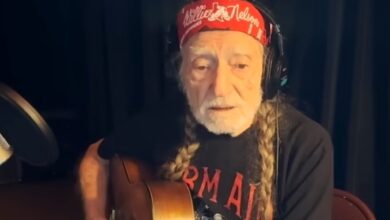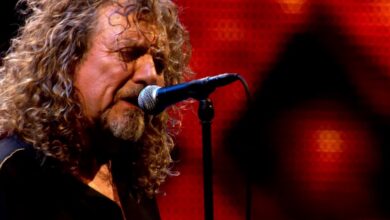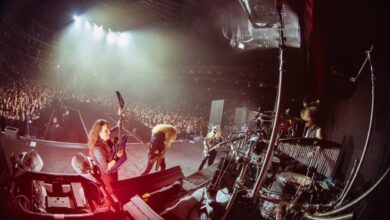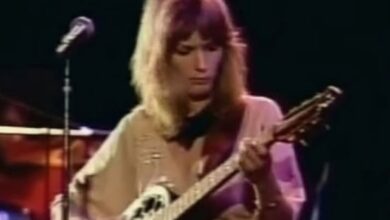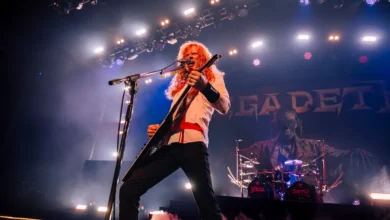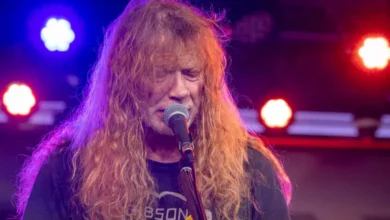Metallica Unleashed Pure Chaos with a Thunderous “Master of Puppets” at Melbourne 2025
The cold Melbourne air did nothing to cool down the mood inside Marvel Stadium on November 8, 2025. By the time the lights dimmed for the closing stretch of Metallica’s M72 World Tour stop, 50,000 people in black shirts and worn-out denim were buzzing with that particular mix of exhaustion and adrenaline you only get at the end of a truly huge show. They’d already been hammered by nearly two hours of metal, but there was a sense of collective, almost childlike anticipation in the stands. Everyone knew what was still coming. Buried near the end of the setlist was “Master of Puppets,” and even before the first note, you could feel the entire building leaning toward it.
For Australian fans, this wasn’t just another tour stop; it was payback for a decade-long itch. Metallica hadn’t played Australia since 2013’s Soundwave run, and their planned 2019 arena dates were scrapped when James Hetfield entered rehab, leaving thousands with tickets they never got to use and a lingering sense of unfinished business. When the band finally rolled into Melbourne in 2025, local media framed it as a long-awaited homecoming, and you could see that history etched on the faces of grizzled lifers and wide-eyed newcomers alike. The sense of relief when Hetfield walked out smiling, apologised for the past, and asked everyone to treat the show as a release from life’s heaviness gave the whole night a quietly emotional undercurrent.
The warm-up was anything but gentle. Suicidal Tendencies hit first, turning Marvel Stadium into a crossover thrash boot camp, with Mike Muir ping-ponging across the stage and new drummer Jay Weinberg battering the kit like he was trying to knock dents in it. Evanescence followed with a very different kind of heaviness—Amy Lee’s cathedral-sized voice soaring over piano and crunching guitars, “Bring Me to Life” turning the vast venue into a multi-generational sing-along. By the time the stage crew flipped the rig for the main event, the crowd already felt like they’d been through a mini-festival. There was sweat on brows, beer on the floor, and the kind of white-noise chatter that says people are both wrecked and ready for more.
Metallica’s entrance was cinematic in the way only they can pull off. AC/DC’s “It’s a Long Way to the Top (If You Wanna Rock ’n’ Roll)” blasted over the PA—a cheeky nod to local royalty—before Ennio Morricone’s “The Ecstasy of Gold” rolled across the screens, the traditional cue that the Four Horsemen were about to ride. Then, bang: “Creeping Death” as an opener, “For Whom the Bell Tolls” right behind it, “Fuel,” “The Memory Remains,” “The Unforgiven,” “Wherever I May Roam”—a run so stacked that in another band’s world it might have been an encore. Hetfield prowled the circular stage like a man born on it, Lars Ulrich grinned and gurned behind his kit, Kirk Hammett flashed his usual wah-soaked flourishes, and Rob Trujillo whipped his hair like an industrial fan.
Midway through, Kirk and Rob stepped into their now-traditional “doodle” segment and made it very clear what country they were in. After nods to John Butler in Perth and INXS/The Angels in Adelaide, Melbourne got a full-throated blast of The Living End’s “Prisoner of Society.” The moment they hit the riff, the stadium turned into a punk choir, locals screaming along to a song they’d probably thrashed in garages for years. It was a small section of the night in terms of minutes, but it said a lot about how carefully Metallica had tailored these Australian dates—each city getting its own little musical in-joke, its own place in the wider M72 story.
From there, the band shifted into their more expansive material: the slow-burn drama of “The Day That Never Comes,” the modern bite of “Moth Into Flame,” the hulking stomp of “Sad But True,” and a mass phone-light sway for “Nothing Else Matters.” The stadium—Docklands’ multipurpose Marvel Stadium, used to hosting footy finals and pop spectaculars—felt smaller by the song, shrunk by the sheer volume and shared focus. When “Seek & Destroy” and the new-school rocket “Lux Æterna” kicked in, it was clear the show had turned the corner into its final act. Fans who’d studied setlists from Perth and Adelaide knew what that meant: the holy trinity of closers was coming, with “Master of Puppets” sitting right at the heart of it.
The transition into “Master of Puppets” was a masterclass in tension. The lights cooled into harsh whites and deep reds while smoke coiled around the stage legs. For a split second, there was silence—a genuine pause, the kind you don’t often get at stadium shows. Then Hetfield’s right hand came down and that legendary down-picked intro riff exploded out of the PA. The effect was immediate and visceral: pits reignited, people in the stands jerked to their feet, and the stadium’s collective voice flipped from chatter to a unified roar on the very first “MASTER!” It’s one of those intros that doesn’t just start a song; it flips a switch in the human brain.
From the first verse, you could tell how deeply ingrained this song is in Metallica’s DNA and in the crowd’s. Hetfield spat out “End of passion play, crumbling away” with a gravelly authority that made the words feel less like fantasy and more like autobiography. His years of wear, recovery, and reflection have turned the once-youthful snarl into something richer and more ominous. Hammett’s rhythm work locked in with Trujillo’s bass, building a tight, churning foundation while Ulrich’s snare snapped like a whip. On the floor, every gap between bodies seemed to disappear, fans pressing closer, shouting lyrics at each other’s faces as much as at the stage, as if they were trying to exorcise the lines from their systems.
The first chorus turned Marvel Stadium into a call-and-response machine. Hetfield barely needed his mic; the crowd was perfectly happy to handle the “Master! Master!” chants themselves, stacking their voices on top of his like an extra instrument. Up in the nosebleeds, people who had been sitting for large chunks of the night were suddenly bouncing in place, drinks forgotten, arms thrown over strangers’ shoulders. You could spot teenagers who’d discovered the song via Stranger Things standing next to fans who likely bought the original cassette in 1986, both generations mouthing the same words. It’s not often a song with this much complexity plays like a pop hit, but in that chorus, “Master of Puppets” might as well have been the world’s heaviest stadium anthem.
Then came the song’s midsection—the part that separates casual listeners from zealots. The tempo eased off, the guitars drifted into those twin harmonies, and the lights softened into a more contemplative palette of blues and purples. Hammett and Hetfield stood closer together, letting those interlocking leads sing over Ulrich’s tom patterns, and for a minute the stadium felt strangely intimate. You could almost imagine being in a much smaller room, watching four guys jam through the bridge of a song they probably had no idea would still be conquering sports stadiums forty years later. In the crowd, people who’d been flailing in the pit a moment earlier now raised invisible lighters, swaying to a melody that somehow manages to be both mournful and triumphant.
Of course, the respite didn’t last. As soon as the clean guitars fell away and that sinister spoken section and chugging build-up kicked in, Marvel Stadium shifted gears again. Ulrich drove the band into the acceleration like a man flooring a muscle car, hi-hats and snares blurring into a martial gallop. The screens flashed rapid-fire imagery—fractured puppets, shattered crosses, abstract bursts of color—while strobes began slicing the air in aggressive pulses. On the floor, circle pits erupted like whirlpools, sucking in anyone willing to risk a few bruises in exchange for the thrill of thrashing at warp speed beneath the “Master, master, where’s the dreams that I’ve been after?” barrage.
Hammett’s solo was raw, slippery, and gloriously human. This wasn’t a sterile, note-perfect recreation; it was a living, breathing lead break, drenched in wah and tinged with just enough chaos to feel dangerous. On the big screens his fingers looked like a blur, dancing up the fretboard while the camera caught flashes of concentrated frustration and joy on his face. Every time he hit one of those long, bending notes that seem to hover just on the edge of collapse, the crowd reacted like a football crowd seeing a goal scored—arms shot up, beers sloshed, and a few thousand hoarse voices screamed in pure appreciation. Even in a set packed with famous solos, this one felt like the night’s emotional peak for guitar diehards.
Meanwhile, Trujillo and Ulrich turned the back half of the song into a full-body experience. Trujillo’s bass rumbled like distant thunder, locking so tightly with the kick drum that you could feel it in your sternum more than you could hear it in your ears. Ulrich, often the subject of all kinds of drummer debates online, played with manic enthusiasm, driving the song forward with flurries of fills and an almost punk-rock refusal to treat any section as routine. As the band hammered out the final chugs and stabs, the entire stadium seemed to be moving in a single, unified rhythm, like four musicians were puppeteering 50,000 bodies on invisible strings.
When “Master of Puppets” finally crashed to its abrupt, clanging end, there was a momentary, stunned pause—just long enough for everyone to realise they’d been holding their breath. Then Marvel Stadium detonated. People hugged strangers, slammed back the last of their drinks, or simply stood there, sweating and smiling in that dazed way you see after a rollercoaster. Hetfield looked legitimately moved, pacing the stage and soaking it in before releasing one of his trademark “YEAH!” barks into the mic. For a lot of fans, this was the song they’d come for, the one they’d imagined in 2019 before those shows vanished from the calendar. Hearing it delivered with this much force felt like a promise finally being kept.
Crucially, “Master of Puppets” wasn’t the end; it was the gateway into an almost comically stacked finale. The band slid straight from that thrash masterpiece into the haunting war-zone of “One,” with its shell-shock visuals and machine-gun light show, and then into the immortal party-nightmare of “Enter Sandman” to close things out. The effect was like a three-part thesis on everything Metallica does best: epic storytelling, technical brutality, and monster hooks. But even among that company, “Master of Puppets” felt like the purest distillation of who they are—a song that’s somehow both complex and instantly accessible, punishingly heavy yet weirdly uplifting.
As punters spilled out into Docklands, jostling for trams and rideshares, you could hear it in the post-show chatter. People compared notes on the setlist, argued over whether “The Day That Never Comes” or “Moth Into Flame” hit harder, and bragged about catching drumsticks or guitar picks. But every other conversation seemed to loop back to the same moment: the instant Hetfield’s right hand dropped into that opening riff and Marvel Stadium collectively went off the rails. In an age where most people first encounter “Master of Puppets” via a streaming algorithm or a Netflix sync, seeing it delivered at deafening volume, under open sky, by the men who wrote it, felt like the kind of rite of passage no playlist can replicate. Melbourne waited a long time for that feeling—and on this night, they got it in full.
